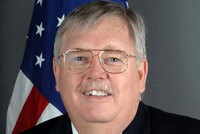John Tefft comes to Russia to arrange another revolution?

Presidential aide Yury Ushakov confirmed on Wednesday that the Kremlin gave an agreement to the appointment of American diplomat Ambassador John Tefft as a US Ambassador to Russia. Tefft's candidacy for the post will have to be approved in the U.S. Senate, although, most likely, this is a formality. One can already say that the new U.S. Ambassador to Russia will be John Tefft.
It is worth noting that Yury Ushakov described Tefft as a diplomat of high caliber, who knows Russia. However, he did not comment on the work of the American diplomat either in Georgia, where he served as an ambassador during the conflict in August 2008, or in Ukraine (2009-2013).
In general, Russia is being cautious to Mr. Tefft, to put it mildly. The U.S. diplomat played a significant role during the so-called "Orange Revolution" in Ukraine. In Tbilisi, Georgia, he enjoyed the sympathy of then-Georgian President Mikhail Saakashivili.
When it became known that Barack Obama's administration was going to nominate John Tefft for the post of the Ambassador to Russia, the comments in the Russian press were mostly based on his role in "color" revolutions in the former Soviet Union. Is Tefft coming to Russia to arrange another revolution? With his appointment, some believe, the White House allegedly shows the Kremlin how the relations between the two countries deteriorated: Tefft can not be described as a friend of Russia.
It should be noted that the American diplomat served in Moscow as Deputy Chief of the Mission in 1996-1999. Incidentally, it was a very difficult period in the relations between the West and Russia, as well, if we recall the events in Yugoslavia.
Unlike previous Ambassador Michael McFaul, John Tefft is a career diplomat, who has worked in the field for over 40 years. Yet, both McFaul and Tefft are associated with "color "revolutions. The first one, however, was more of a theorist, whereas the second one was a "practical worker" in the field. In a nutshell, both during the "reset" period and now, Washington sends to Moscow the people, who certainly will not be met with open arms.
This is absolutely conscious policy, although it is not very clear, what objective it pursues. Michael McFaul appeared to be a frankly weak ambassador, who proved to be a bad moderator for the Russian opposition. If it is planned that it is now Mr. Tefft, who will play the same role, then he is unlikely to achieve great progress either. Moscow is neither Tbilisi, nor Kyiv, after all.
As already mentioned above, the Kremlin is cautious in its comments about the possible appointment of John Tefft, preferring to focus more on his previous work. Was it possible for Russia to decline his candidacy? Technically, it was, although it would have sparked a large scandal, of course.
"This is an extremely rare case of diplomatic practice, and it shows a very strong, hostile signal to the state that sends an ambassador. Therefore, saying no to the approval of his candidacy was quite difficult, especially in current conditions," General Director of the Russian Council for International Affairs, Andrei Kortunov said.
"As for Tefft, I know the man a little. I can say that he is a professional, unlike Michael McFaul," he said in an interview with Pravda.Ru.
According to our expert, "expecting a change in Washington's course towards Russia from the new ambassador is difficult, because it is not the embassy, and not even the State Department, but the White House and President Obama, who determine this course."
At the same time, the expert believes, Tefft "will not make any obvious errors and will act carefully."
"As we know, when we had Michael McFaul, and when problems started to arise in our relations, many Russian politicians refused to meet with the American ambassador, and McFaul's circle of communication in Moscow was very limited. There is a trend now to limit communication with the Americans," he said.
"If the circle of his communication in Moscow is going to be limited, it seems that opportunities for such a dialogue, which could affect our relations, will be limited too. If decisions are made to open the doors to the American ambassador, then he will have more opportunities," said Andrei Kortunov.
Oleg Artyukov
Pravda.Ru
Subscribe to Pravda.Ru Telegram channel, Facebook, RSS!


